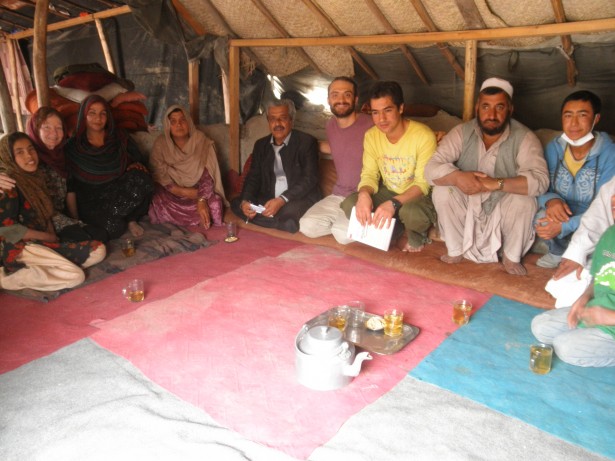Why did the peace movement of the middle of the last decade not grow larger? Why did it shrink away? Why is it struggling now?
As has been documented, a huge factor in the shrinking away was partisan delusion. You put a different political party's name on the wars and they become good wars.
But that also means that what you had was a peace movement that believed in the possibility of good wars. In fact, much of it believed that Iraq was a bad war and Afghanistan a good war. Many people even went out of their way to display their "reasonableness" by declaring Afghanistan a good war without actually examining the war on Afghanistan; this was imagined to be a strategic way to prevent or scale back or end the war on Iraq.
Of course, when the bad war ends, and all that's left is the good war, those who are actually motivated by opposition to war must shift to opposing the former good war as the current bad war. And why would you listen to anyone who did that?
Many, of course, opposed the war on Afghanistan until the invasion of Iraq, and then switched to talking almost exclusively about Iraq. Afghanistan was labeled the good war once Iraq had happened, just as World War II was labeled the good war once Vietnam had happened. Our beliefs regarding contrasts between Iraq and Afghanistan are mostly false. The invasion of Afghanistan was no more legal or moral or honest or U.N.-authorized than the invasion of Iraq. The occupation of Afghanistan is no less of a vicious one-sided slaughter of helpless people who wished us no ill than the occupation of Iraq was.
But we aren't in the habit of talking about wars as one-sided slaughters of innocent men, women, and children. And we aren't in the habit precisely because that is the essential feature that all of our wars share in common.
When we chose to oppose the war on Iraq without opposing all wars, we were obliged to find a reason why. We were obliged to oppose the war . . .
· because Iraq had no weapons (as if a government's possessing weapons were grounds for its people being bombed -- a notion that could cost Iran dearly),
· or because Iraq had nothing to do with 9-11 (as if a government's association with a group affiliated with a party having once met with a wing of an organization connected to a group involved in 9-11 were grounds for being bombed -- a notion now costing the lives of drone strike victims by the thousands, not to mention sustaining the war on Afghanistan),
· or because the war in Iraq wasn't being won (a notion that helped escalate that war and later the occupation of Afghanistan as well),
· or because -- in fact -- the war on Iraq was a Republican Party war (as of course it was not; just check who controlled the U.S. Senate at the time -- remember the Senate, that body that long prevented President Obama from doing any of the wonderful things he'd like to have done in his secret, if not imaginary, heart of hearts? And look at what happens to opposition to Republican wars when a Democrat is put on the throne.)
A forthcoming book by Paul Chappell is even better than all of his other ones, and I highly recommend it, but it's marred by advocacy for appealing to people's patriotism and religion. I attended a peace conference recently at which some of the speakers claimed that the movement against the war on Iraq had been more strategic than that against the war on Vietnam, and had done so by appealing to patriotism, waving flags, avoiding disrespect for the U.S. military, and not opposing war in general. For several years now, peace groups have been preaching that it would be unstrategic, if not racist, to oppose President Obama. We must oppose Obama's wars, but not him or his political party, as that might turn people off. So we're told.
Often it's considered humble and inclusive to reach people "where they are" and nudge them ever so slightly toward where you'd like them to be. And most of our country is saturated with militarism. But if a peace-in-certain-circumstances movement does manage to turn out a crowd for a march or two, what remains behind when the marches are over? Certainly not an understanding of what's wrong with militarism. Not even an understanding of what the war was that was marched against.
A majority of Americans believes the war on Iraq benefitted Iraq but hurt the United States. A majority wanted that war ended, year after year, for several years, many motivated by selfishness -- by a desire to cease bestowing such philanthropy on the undeserving and ungrateful people of Iraq. A majority believes President George W. Bush lied the nation into the war, but not that all wars are begun with similar lies. And almost no one in the United States understands what was done to Iraq, that more Iraqis and a higher percentage of Iraqis were killed than were Americans in our civil war, or British or French or Japanese or Americans in World War II, or that three times that many Iraqis were made refugees, that towns and neighborhoods and populations were wiped out, infrastructure destroyed and never yet rebuilt, cancer and birth defects at record levels, civil rights worse than under Saddam Hussein's dictatorship, a nation devastated as totally as almost any other in history.
We opposed this without understanding a fraction of it, without educating others about it, and without displaying disrespect for the U.S. military. Is that an accomplishment to be truly proud of? How can counter-recruitment efforts possibly succeed in limiting the military's supply of cannon fodder if the peace movement doesn't disrespect the military? I think the simplemindedness here is not in the public we're so arrogantly trying to manipulate gently, but in ourselves. When we tried to impeach George W. Bush it was not with ill-will toward him, but with an eye on the future behavior of future presidents. When we treat membership in the U.S. military as respectable, how can we simultaneously convey to high school students the disgust we will feel for their action, should they choose to enlist? I said for their action, not for them. Are we not capable of recognizing the economic bind students are in and nonetheless stigmatizing participation in mass-murder? Or are we perhaps not even capable of recognizing mass-murder for what it is?
Here's a secret about people in this country: they don't support mass murder. Here's another: they're not stupid. So, when you force them to be aware that their government is committing mass murder and glorifying it, they get upset, angry, and often energized to make a change. And when you talk to them honestly, they know you're being honest even if they don't agree with you at first. And when you respectfully disagree, they are able to notice whether your position makes any sense. So, if you oppose wars because you oppose killing people, you have to explain to everyone you can that you oppose wars because they kill people. You can't say "I oppose this particular war because Paul Bremmer did something dumb," because everyone will fantasize about a future war that doesn't include the dumb thing. And once you've said that, you have to downplay the fact that the war is an act of mass-murder, because if it were, then why wouldn't you be opposing it for that reason? Why wouldn't your interlocutor as well? You have joined in a cooperative agreement to keep that matter secret as you turn the conversation to the WMD lies or the financial costs or the costs to the U.S. troops who made up 0.3% of the deaths.
On the train home from a recent peace conference, I spoke to a young woman who told me she was studying dentistry and would be in the Air Force. Couldn't she be a dentist without the military, I asked? No, she answered, not without $200,000 in debt. Yes, I replied, but without the Air Force, we could have free colleges and no debts. No, she replied . . . and, if you think for a moment, I know you'll know what she said next. It had nothing to do with the lies about Iraq, the financial cost of Iraq, the number of U.S. troops killed in Iraq, or what war mongers the Republicans are. It had nothing to do with any of that. Think for a second, and you'll know.
Got it? She replied: if we didn't have the Air Force, North Korea would kill us.
Now, if you have a little education you probably realize that North Korea couldn't attack the United States without being completely obliterated, and that any nation on earth would scream angry threats if we pretended to drop nuclear bombs on it after having destroyed all of its cities, killed millions of its people, and threatened and antagonized it for over half a century through control of the military belonging to its former other half.
But if you'd just learned that the war on Iraq was a dumb war that cost too much, that nothing is more heroic than militarism, that even the peace movement should be led by soldiers, and that waving flags and valuing a particular 5% of humanity to a special degree are admirable values, where would you be? What would you know about militarism, where it exists, or how it functions?
There will always, always, always be another North Korea that's supposedly about to kill us. We don't need rapid-response fact corrections. We need citizens with some understanding of history, with knowledge of the Other 95%, with the capacity to resist terrorism-by-television, and capable of independent thought. To get there, we need a peace movement that moves us, at whatever pace it can, toward peace -- toward the popular demand for the absolute abolition of all war.

















